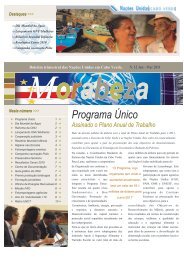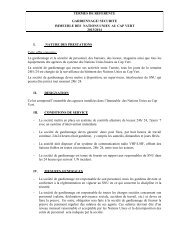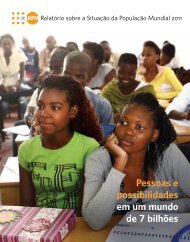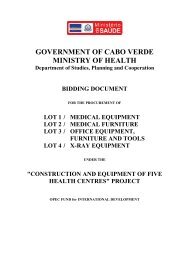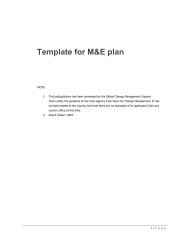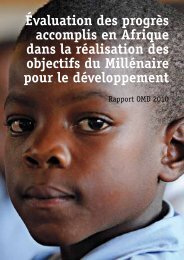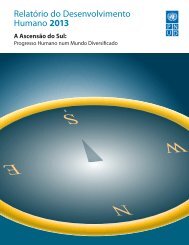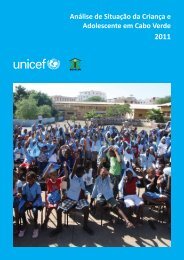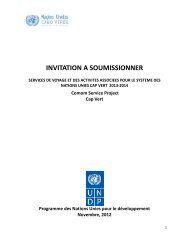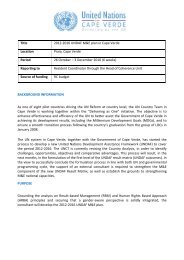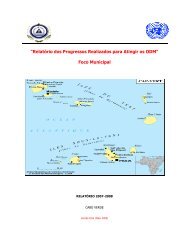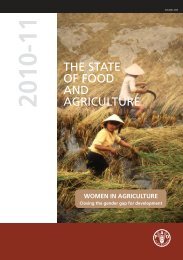PERSPECTIVEAdolescent girls:The best investment you can makeby Maria Eitel,President of theNike FoundationThere are more than 515 million adolescent girls living inthe developing world today. These girls have the potentialto accelerate growth and progress in every sector, to breakthe cycle of intergenerational poverty and to advance wholeeconomies. And yet girls are often overlooked. Adolescentgirls are more likely to be pulled out of school, married offand infected with HIV. They also face the reality that a leadingcause of death for a girl 15 to 19 years old is related topregnancy and childbirth. Families who have nothing elsemay resort to treating their daughters as commodities, to bemarried off or sold. Despite such adversities, adolescent girlsare the most powerful force for transformative change.Yes, girls often face immense barriers, but they also holdunique promise. That is the other side of the story – the GirlEffect. This is the story of girls who are counted, invested inand included in society. When a girl in the developing worldreceives seven or more years of education, she marries fouryears later. An extra year of primary school boosts girls’eventual wages by 10 to 20 per cent. Studies in 2003 showedthat when women and girls earn income, they reinvest90 per cent of it into their families, as compared to the 30 to40 per cent that men and boys contribute. Research has alsoshown that higher levels of schooling among mothers correlatewith better infant and child health. Yes, this is the GirlEffect, and we have only begun to see its myriad effects.It is truly remarkable how investing in one girl can generateripples of change that benefit her family, her village and hercountry. Girls all over the world are putting the Girl Effectinto motion every day despite the countless obstacles intheir lives. Sanchita, a 17-year-old from Bangladesh, is oneof these girls. Born into poverty, Sanchita had no money forschool, clothes or food. Thanks to BRAC, she received a smallloan to buy a cow. She sold the cow’s milk and used themoney to pay for her own schooling and that of her brother.BRAC also helped her learn skills that have enabled her togrow her own vegetables and continue to earn an income forher family and herself. Stories like Sanchita’s serve as beaconsof hope – and as tangible proof that investments in girlscan result in significant economic and social change. The GirlEffect is real, and its impact is both extensive and profound.I have seen this change take hold in Bangladesh, Brazil,Burundi, Kenya, Uganda, the United Republic of Tanzania andcountless other countries. Girls around the world are puttingthe Girl Effect into motion when they are given the tools todo so. At this very moment, girl entrepreneurs in India aredrafting their business plans, girls in Bangladesh are studyingto be nurses so they can meet the health needs of thosewho have been largely ignored, and girls in Uganda and theUnited Republic of Tanzania are receiving life-skills trainingand gaining access to microfinance, benefiting from safespaces where they are allowed to dream big and to translatethese dreams into reality.But there is still much work to be done. In order to knowwhat is happening to girls, and to track their progress or lackthereof, we urgently need data disaggregated by sex andage. We need to show the value in girls and convince governments,villages, corporations and families that investing inadolescent girls is a smart endeavour. We must bring girlsinto the center of our discussions, acknowledge them as aunique population and address their particular needs.Unleashing the potential of adolescent girls begins with ourdoing the following:1. Stop using girls as the infrastructure of poverty.2. Don’t assume you have girls covered in yourprogrammes. Specifically address them.3. Count girls – look for them in your numbers.4. You don’t need to change your strategy, justinclude girls in what you already do.5. Enforce policies that are already in place.6. Men and boys can be champions for girls.7. Don’t treat girls as the issue of the day.This approach will yield numerous benefits for decades tocome. If we wholeheartedly invest in girls, we will see strongercommunities and families, sustainable economies, lowerrates of maternal mortality and morbidity, lower rates of HIVand AIDS, less poverty, more innovation, reduced rates ofjoblessness and more equitable prosperity. The Girl Effect isreal, and it is powerful – but we won’t fully realize its rippleeffect until we start taking it seriously and expanding itsscope.Maria Eitel is the founding President and CEO of the NikeFoundation, where she works to promote the Girl Effect – thepowerful social and economic change that ensues when girlshave opportunities. Prior to her work with the Foundation,Ms. Eitel served as the first Vice President of CorporateResponsibility at NIKE, Inc. Before that, she served at theWhite House, the Microsoft Corporation, the Corporation forPublic Broadcasting and MCI Communications Corporation.74THE STATE OF THE WORLD’S CHILDREN 2011
FOCUS ONWorking together for adolescent girls: The United Nations AdolescentGirls Task ForceIn 2007, a number of United Nations agencies* founded the United NationsAdolescent Girls Task Force. With support from the UN Foundation, the TaskForce aims to strengthen interagency collaboration at both the global andcountry levels; facilitate the development of effective programmes to addressthe rights and needs of adolescent girls; support the drive to achieve theMDGs; and eliminate all forms of violence and discrimination against girlsand young women.In March 2010, the Task Force launched a Joint Statement for AcceleratedEfforts to Advance the Rights of Adolescent Girls signed by the heads ofthe six agencies. The agencies committed to increasing support to governmentsand civil societies over the next five years to advance policies andprogrammes to empower the hardest-to-reach adolescent girls.The Joint Statement spells out the mandate and the responsibilities of theUN country teams in protecting the rights of the marginalized adolescentgirl. It commits agencies to mobilizing the financial and technical resourcesto work together to identify five strategic priorities for fulfilling the rights ofadolescent girls. These priorities include:• Educating adolescent girls.• Improving the health of adolescent girls.• Keeping adolescent girls free from violence, abuse and exploitation.• Promoting leaders among adolescent girls.• Counting adolescent girls to advance their well-being and realizetheir human rights.See References, page 78.* Participating agencies include International Labour Organization, United Nations Children’s Fund, United Nations Educational, Scientific and Cultural Organization, United Nations Population Fund,United Nations Entity for Gender Equality and Empowerment of Women, and World Health Organization.have been left behind. Policies and programmes aimed atachieving the MDGs too often ignore the situation of thepoorest and most marginalized adolescents and youth,even those in middle-income and industrialized countries.Fulfilling their rights to education, health and recreation; toan environment without violence; and to having their voicesheard in decision-making processes are all conditions forachieving social equality, pro-poor economic growth andexpanded citizenship.Moreover, an equity approach to adolescent developmenthighlights the urgent need to identify the most marginalizedand vulnerable adolescents in every society, to design anddevelop relevant and innovative approaches to reach andengage them, and to ensure that investments are targetedto give them equal access and opportunities for growth anddevelopment.In an effort to move towards greater equity in health,national governments are taking action, with internationalsupport, to abolish user fees for critical health services.Countries that have done so include Burundi, Ghana,Kenya, Lesotho, Liberia, the Niger, Senegal and Zambia.Donor countries such as France and the United Kingdomoffer incentives to eliminate fees by providing additionalaid to countries that remove them. Development agenciessuch as the World Health Organization and the WorldBank have also taken strong positions against user fees inhealth care. 20 When partners come together in this way,significant advances in human rights can be achieved.Working together for adolescentsIn 2010–2011, the world celebrates the International Year ofYouth (IYY). Since the first IYY 25 years ago, the world hascome a long way in recognizing and advancing the rights ofyoung people. Governments adopted the Convention on theRights of the Child (1989), two optional protocols protectingchildren from armed conflict and sexual exploitation(2000), the International Labour Organization Conventionon the Worst Forms of Child Labour (1999) and theMillennium Development Goals (2000).Equal rights to education, health, employment, juvenile justice, religion, culture and identity areall imperative to the positive development of young people. A peer education trainer discussesa film, Born with AIDS, at the Adolescent-Friendly Services Centre at Bandar Abbas HealthComplex, Islamic Republic of Iran.Investing in Adolescents75
- Page 2 and 3:
© United Nations Children’s Fund
- Page 4 and 5:
AcknowledgementsThis report was pro
- Page 7 and 8:
THE STATE OF THE WORLD’S CHILDREN
- Page 9:
GLobal challenges for adolescents 1
- Page 12 and 13:
large cohort of unemployed youth, w
- Page 14 and 15:
FOCUS ONEarly and late adolescenceR
- Page 16 and 17:
ment and active participation. Disa
- Page 18 and 19:
age at which individuals are legall
- Page 20 and 21:
the rights of adolescents or to pro
- Page 22 and 23:
The Convention was sufficiently ins
- Page 24 and 25:
Adolescents are often consideredthe
- Page 26 and 27:
HALLENGES ANDRealizing the rights o
- Page 28 and 29:
FOCUS ONDemographic trends for adol
- Page 30 and 31:
country are particularly serious, g
- Page 32 and 33: Gathering accurate data on adolesce
- Page 34 and 35: sexes, there is still a considerabl
- Page 36 and 37: PERSPECTIVEFacing the challenge:Rep
- Page 38 and 39: FOCUS ONInequality in childhood and
- Page 40 and 41: ADOLESCENT VOICESAct responsibly:Nu
- Page 42 and 43: past decade, though not all of them
- Page 44 and 45: Yet other initiatives against child
- Page 46 and 47: PERSPECTIVEChernobyl 25 years later
- Page 48: Adolescents are deeply concernedabo
- Page 51 and 52: OPPORTUNITIESrisk of climate change
- Page 53 and 54: Poverty, unemploymentand globalizat
- Page 55 and 56: PERSPECTIVEThe effects of climate c
- Page 57 and 58: high-level competencies that are in
- Page 59 and 60: a window for possible economic deve
- Page 61 and 62: ADOLESCENT VOICESReclaim Tijuana:Pu
- Page 63 and 64: are exacerbating those risks, inclu
- Page 65 and 66: sentencing wherever possible, inclu
- Page 67 and 68: e stranded in poverty by conflict o
- Page 70 and 71: HALLENGES ANDOver the course of the
- Page 72 and 73: gated by age, disability, sex, ethn
- Page 74 and 75: FOCUS ONPreparing adolescents for a
- Page 76 and 77: the Ministry of Education, in colla
- Page 78 and 79: exactly ‘youth participation’ l
- Page 80 and 81: spaces as part of Aprendiz, the ‘
- Page 84 and 85: ADOLESCENT VOICESFrom victims to ac
- Page 86 and 87: ReferencesCHAPTER 11United Nations,
- Page 88 and 89: 19United Nations Children’s Fund,
- Page 90 and 91: STATISTICAL TABLESEconomic and soci
- Page 92 and 93: Under-five deaths (millions)Region
- Page 94 and 95: STATISTICAL TABLESapproach is not t
- Page 96 and 97: TABLE 1. BASIC INDICATORSCountries
- Page 98 and 99: TABLE 1. BASIC INDICATORSUnder-5mor
- Page 100 and 101: TABLE 2. NUTRITIONCountries and ter
- Page 102 and 103: TABLE 2. NUTRITIONCountries and ter
- Page 104 and 105: TABLE 3. HEALTHCountries and territ
- Page 106 and 107: TABLE 3. HEALTH% of populationusing
- Page 108 and 109: TABLE 4. HIV/AIDSCountries and terr
- Page 110 and 111: TABLE 4. HIV/AIDSEstimatedadult HIV
- Page 112 and 113: TABLE 5. EDUCATIONCountries and ter
- Page 114 and 115: TABLE 5. EDUCATIONPrimary schoolNum
- Page 116 and 117: TABLE 6. DEMOGRAPHIC INDICATORSCoun
- Page 118 and 119: TABLE 6. DEMOGRAPHIC INDICATORSPopu
- Page 120 and 121: TABLE 7. ECONOMIC INDICATORSCountri
- Page 122 and 123: TABLE 7. ECONOMIC INDICATORSCountri
- Page 124 and 125: TABLE 8. WOMENCountries andterritor
- Page 126 and 127: TABLE 8. WOMENCountries andterritor
- Page 128 and 129: TABLE 9. CHILD PROTECTIONChild labo
- Page 130 and 131: TABLE 9. CHILD PROTECTIONChild labo
- Page 132 and 133:
Summary indicatorsAverages presente
- Page 134 and 135:
TABLE 10. THE RATE OF PROGRESSCount
- Page 136 and 137:
TABLE 10. THE RATE OF PROGRESSUnder
- Page 138 and 139:
TABLE 11. ADOLESCENTSCountries and
- Page 140 and 141:
TABLE 11. ADOLESCENTSAdolescents po
- Page 142 and 143:
TABLE 12. EQUITYCountries andterrit
- Page 144 and 145:
TABLE 12. EQUITYBirth registration
- Page 146 and 147:
AcronymsAIDSCEDAWDHSFGM/CGDPHIVIUCW
- Page 148:
United Nations Children’s Fund3 U



